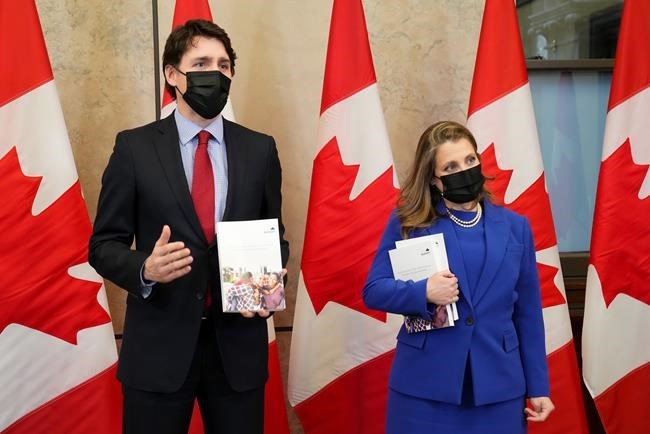OTTAWA — Finance Minister Chrystia Freeland tabled the 2022 federal budget on Thursday. Here are some of the highlights:
— $452.3 billion in new spending on projected revenue of $408.4 billion for a deficit of $52.8 billion. The debt to GDP ratio is pegged at 45.1 per cent.
— $4 billion over the next five years to launch a new fund in the Canada Housing and Mortgage Corporation to help cities and municipalities create more affordable housing, and $1.5 billion over two years to the CMHC’s Rapid Housing Initiative to create 6,000 new affordable housing units with at least one-quarter of the funding dedicated to women-focused projects.
— $625 million over four years, starting in 2023-24, for child care, to help the provinces and territories build new facilities and make new investments. The new funding is a followup to the various federal child-care agreements with the provinces and territories after they raised concerns that non-profit and public providers were facing soaring real estate and building material costs.
— $1 billion over five years, starting in 2022-23, to create an independent federal innovation and investment agency. The measure is designed to spur economic growth and address the fact that Canada is ranked last in the G7 in spending on research and development by business.
— The defence budget got new money with more than $8 billion pledged over five years to better equip the Canadian Armed Forces, reinforce cybersecurity and support a culture of change. The budget contained no road map on whether this would be enough to boost Canada’s defence spending to the NATO target of two per cent of GDP, as the alliance works to bolster Europe following the Russian invasion of Ukraine.
— Up to $1 billion in new loan resources for the Ukrainian government through the International Monetary Fund to help keep its embattled government operating.
— $4 billion over six years, starting in 2021-22, to remove systemic barriers to First Nations children receiving services in health, education and social services. The funds are part of the government’s commitment to Jordan’s Principle, which started in 2016.
— $5.3 billion over five years starting in 2022-23 and $1.7 billion ongoing to Health Canada to provide dental care to Canadians as a result of the Liberal-NDP agreement. The plan will start with children under 12 in 2022 at an initial cost of $300 million.
— $1.7 billion over five years starting in 2022-23 to help make zero-emission vehicles more affordable for people. The Canadian Infrastructure Bank will spend $500 million over five years to build infrastructure to support the 1,500 charging stations that the government has promised to build throughout Canada.
— $547 million over four years starting in 2022-23 to help businesses upgrade their fleets to zero-emission vehicles.
This report by The Canadian Press was first published April 7, 2022.
The Canadian Press



